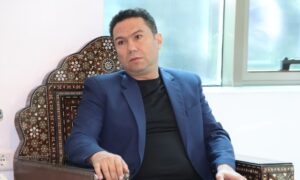
US sends threatening messages to al-Assad: Syrian regime has to adopt new political process… otherwise!

Enab Baladi – Murad Abdul Jalil
The government of the Syrian regime is experiencing a burgeoning economic crisis, that brought the collapse of the Syrian currency—the Syrian pound has reached levels not seen before in the recent history of Syria— at a time when the United States of America (USA) made very strong statements through its prominent officials during the past week.
The statements carried direct intimidating letters to the Syrian regime, its President, Bashar al-Assad, and its allies, Russia, and Iran, illustrating the necessity of seriously engaging in a political solution; otherwise, the Syrian regime has to sustain more economic pressures and tougher sanctions.
These statements and threats come just a few days before the Caesar Act came into effect, which is a bill passed by the US House of Representatives, on 15 November 2016, and approved by the Senate on 17 December 2019.
The Caesar Syria Civilian Protection Act of 2019 provides for punishing any person or entity that provides support to the Syrian regime and obliges the President of the United States to impose sanctions on Assad’s allies.
Bashar al-Assad’s isolation is growing
Over the past years, the US policy was characterized by the cloak and dagger in dealing with the Syrian file. However, last May, the US began to formulate a policy of political and economic isolation of the Syrian regime, tightening economic sanctions, to stifle the regime and force it to engage seriously in the political process under the umbrella of the United Nations.
The US Special Representative for Syria, James Jeffrey, announced for the first time in September 2018, that. the US intends to adopt an “isolation strategy” with its allies, including severe penalties if Assad obstructs the political process.
After nearly two years, with the absence of any development in the political process except for the start of the Syrian Constitutional Committee (SCC) ’s work in Geneva—the regime impeded the second round of the SCC in November 2019— Jeffrey renewed his talk about the US’s isolation strategy, amidst different data on the current political reality.
In a virtual meeting via the Internet with the Syrian community in the US on 8 June, Jeffery outlined the future steps of the US in dealing with the Syrian regime and al-Assad, which are isolating the Syrian regime and ensuring that no one deals with it as a normal regime because “it is not so.”
Besides, the US is also trying to exert pressure on Russia and Iran to stop supporting the regime, applying economic sanctions against the Syrian regime, its supporters, and “activities that help the regime suppress its people and fund reconstruction under the command of the al-Assad regime from any international body,” according to Jeffrey.
Jeffrey did not specify the content of the American offer. Still, he pointed out that Washington “wants to see a political process, which may not lead to a change of the Syrian regime, but demands the Syrian regime to change its behavior and not to provide shelter for terrorist organizations, and a base for Iran to extend its hegemony over the region.”
Arabic Language Spokesperson for the US Department of State, Erica Chiusano, identified what she called the “only exit strategy” for the Syrian regime, in light of the economic crisis.
Chiusano said in a statement that Enab Baladi got by email on 10 June, that “UN Security Council Resolution 2254 is the only exit strategy available to the Syrian regime, and the regime should take irreversible steps to implement a political solution to the Syrian conflict that respects the rights of the Syrian people and their desires or will face more targeted sanctions and isolation.”
Chiusano confirmed that Washington will continue to impose sanctions aimed at increasing economic pressure on the regime until there is irreversible progress in the political track.
Letters to Russia
The US’s statements were not addressing only al-Assad himself, but a large part of them has messages to Russia, for being the most prominent player in Syria, and the greatest supporters of the regime. Jeffery courted Moscow in September 2019; he implicitly called for an agreement that would help remove Iranian forces from Syria and contribute thoughtfully to a political solution.
Jeffrey stressed that the US is in contact with Russia, while Arabic Language Spokesperson for the US Department of State, Erica Chiusano, stated that the policy of the US does not require the removal of Russia from Syria.
Responding to Enab Baladi’s questions, Chiusano said that US policy in Syria focuses on finding a negotiated political solution to the conflict, in line with UN Security Council Resolution 2254.
In response to the US’s courting, Moscow announced, through Deputy Foreign Minister, Sergey Ryabkov, its readiness to hold a dialogue with the US on Syria “if it wants to.”
Ryabkov said in a news conference held on 9 June that Russia will expand the dialogue with America on Syria, if it responds to that and wants it, “we are ready on our side.”
According to a statement released by the US department of state, Special Representative for Syria Engagement Ambassador James Jeffrey held talks with the Russian Deputy Foreign Minister Sergey Vershinin on the situation in Syria.
The US department of state explained that “Jeffrey discussed with Vershinin the political process for the settlement of the Syrian crisis under UNSCR 2254, which provides for the sovereignty, independence, and territorial integrity of Syria.”
SANA, a Syrian state-controlled news agency, quoted a source in the Syrian regime’s Ministry of Foreign Affairs as saying in response to Jeffrey’s demands, that the Syrian regime considered that “applying further sanctions is another aspect of the declared war on Syria, and that the US looks at the region through the Israeli eyes because the demands that Jeffry talks about are old and renewed Israeli demands to establish control on the region.”
In light of the well-known intransigence of the Syrian regime and its attempts to confront the deterioration of the Syrian pound with a security mindset through raiding money exchangers or taking new procedures, including asking for support from its allies, the Syrians are waiting for what will come in the next days with the entry of “the US Caesar Act” into effect, fearing an increase in the deteriorating living conditions, or hoping for a transformation that could trigger an actual political process.
if you think the article contain wrong information or you have additional details Send Correction
النسخة العربية من المقال
-
Follow us :
Most viewed
- Syrians pack their bags in Turkey
- After European call to engage with Syrian regime, Italy appoints ambassador to Damascus
- Syrian pressures prevent Omar al-Aroub from attending Paris Olympics
- Turkey and Russia discuss resuming patrols on M4 highway
- After Baraa Qaterji’s elimination, Is Syrian regime replacing its economic façade?

















 A
A
A
A
A
A








 More Politics
More Politics